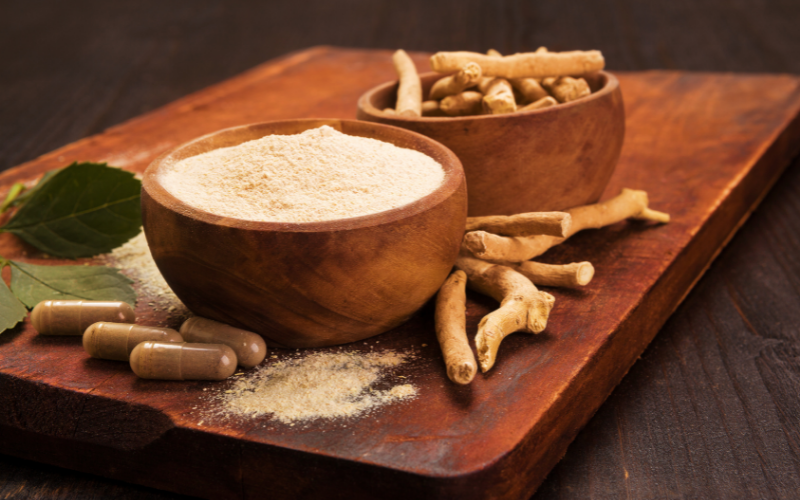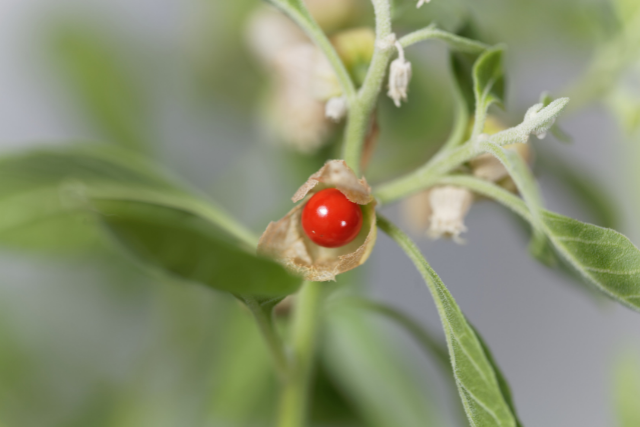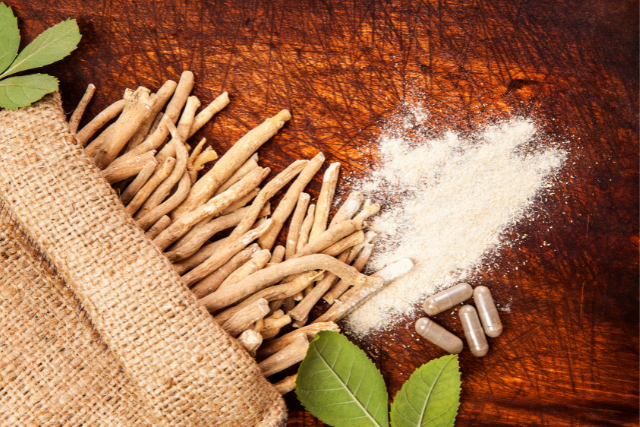Ashwagandha: The Indian Ginseng
By admin

Centuries after the groundwork of Ayurveda was established, many of its extraordinary remedies and herbs have stayed relevant in health. Hundreds of herbs used in Ayurveda continue to exist in the ingredients of beauty products and medicinal supplements. This time, we speak of the fabulous herb we call Ashwagandha in Ayurveda, and “The Indian Ginseng” in English. Long after Ayurveda claimed its various health benefits, today, medicine has accepted its relevance and advantages. And we are here to tell you all about it!
What is Ashwagandha?

Ashwagandha or the Withania Somnifera (its botanical name) refers to an evergreen shrub found in parts of India, the Middle East, and Africa. Ancient Ayurveda used it for medicinal treatments in the past to reduce stress, anxiety, fatigue, pain, and skin conditions. The name “Ashwagandha” literally translates to “one that smells like a horse” to describe its root’s unique smell. Popularly, it is known by many other names such as the Indian Ginseng, Poison Gooseberry, and Winter Cherry.
Ashwagandha plants are short and tender, with bright red-orange fruits that grab your attention. The leaves of the winter cherry are dull green and the flowers are yellow and bell-shaped. Usually, the beautiful fruit of this evergreen shrub and its nutritious roots are used for medicinal/beauty benefits.
Why is Ashwagandha Used as A Medicine?
Traditionally, Ayurveda calls Ashwagandha a “Rasayana”, which refers to a set of herbs that help in maintaining mental and physical youth. It was prescribed for a more healthy and resilient living. For over 3,000 years this ancient healthcare system has used this fascinating herb to reduce anxiety, increase energy levels, and even improve brain function.
In modern medicine, Ashwagandha is classified as an adaptogen. Adaptogens are utilized in herbal therapy to promote homeostasis (the stable physiological conditions the body strives to achieve amidst changing conditions). They have a calming effect. If consumed, they play a major role in managing stress. They increase the resistance capacity of bodily systems to stress and in turn, hold-off exhaustion due to stress. Because of this effect Ashwagandha can have on stress, it helps with other health issues including high blood-sugar levels, insomnia, pain, fatigue, and much more.
Health Benefits of Ashwagandha
Several different treatments make use of various parts of the Ashwagandha plant whether it’s the leaves, seeds, flower, or fruit. Presently, this plant is becoming increasingly popular in the West and is available as a supplement in many countries. Here are some impressive health benefits of Ashwagandha:
Reduces Stress-Related Symptoms
Prolonged stress can feel like a mental problem. Stress leads to the production of a certain hormone called “cortisol”. Chronic stress can lead to the excessive production of cortisol and can cause several health issues in the long run.
As an adaptogen, the Indian Ginseng is anti-stress and anti-anxiety. This is associated with several health benefits, that we discuss below.
- Many studies have shown that people who took (under guidance of certified practitioner) this herb report reduced cortisol and stress levels than people who did not. By reducing the cortisol levels in your body ashwagandha improves overall strength and immunity.
- Ashwagandha is known to have a calming sedative-like effect, which makes it valuable to reduce anxiety. Several studies have shown that the prescribed dosage of this herb reduces insomnia and stabilizes sleep problems.
- Cortisol is associated with stress-induced weight gain. Ashwagandha not only decreases the levels of cortisol but reduces the content of fats like cholesterol and triglycerides in the bloodstream. This can aid in weight loss and combating obesity.
- A study found lorazepam-like anti-anxiety effects upon the dosage of Ashwagandha, indicating that it could be a good herbal substitute for anxiety drugs. However, its indications and conclusions are limited because this study was conducted on mice.

Drops Blood Sugar Levels
High blood sugar is yet another symptom that is associated with stress. The Indian Ginseng may be helpful for diabetics because it has repeatedly been found to reduce blood sugar levels.
Some research has shown that chemicals in ashwagandha can be effective in increasing the secretion of insulin, which is the hormone responsible for digesting the sugar in your body. However, because of this characteristic of the herb, a limited dosage of ashwagandha is recommended. Very low blood sugar can be harmful.
Relieves Arthritis
Several studies have proven that ashwagandha has a painkiller-like effect. It relieves pain and has anti-inflammatory effects on your cells. Studies have found that this herb can prevent pain signals from traveling to your brain, hence, being effective in relieving joint pain. This makes it a possible remedy for rheumatoid arthritis.

Improves Brain Function
Ayurveda has claimed the advantage and benefits of Ashwagandha on memory and concentration for centuries. Recent studies have proven some truth to these claims as they have found that Ashwagandha has beneficial effects on neural activity and in turn, improves brain function. This can be effective in preventing loss of brain function in diseases like Alzheimer’s, Huntington’s, and Parkinson’s, which all have neurodegenerative features.
The evergreen herb has anti-oxidants and can prevent oxidative damage to neurons. Some studies on animals have found that Ashwagandha is helpful with memory issues caused by damage or disease. Other studies conducted on humans have shown an association of Ashwagandha dosage with reaction time, task performance, and attention.
Might Have Anti-Cancer Effects
This is one of the most fascinating benefits of the herb. Ashwagandha contains a chemical called Withaferin, which may aid in the decrease of cancer cells. It is associated with an increase in reactive oxygen species (ROS), whose existence can cause cancer cells to malfunction. Studies have also shown that withaferin weakens these cells, making them more susceptible to malfunctioning. Therefore, ashwagandha may be able to inhibit tumour growth in certain illnesses.
Increases Fertility in Men
Traditionally ashwagandha was recommended to men for consumption because it is associated with strength and increased stamina. Recent studies have found that the Poison Gooseberry can be effective in increasing testosterone and increasing sperm count. The anti-oxidant nature of the herb may work as an anti-stress agent, ensuring better health of the male reproductive system. Therefore, Ashwagandha dosages are prescribed to increase fertility.
Improves Heart Health
High cholesterol can be a problem for many of us with our modern fast-food-filled lifestyle. Luckily, research on Ashwagandha has shown impressive results, indicating that the herb might play a role in reducing cholesterol.
In animal studies, the herb was directly associated with decreasing blood fats. Its dosage was associated with triglyceride, which is a type of fat in our body. A high dosage of Ashwagandha showed a decrease in bad cholesterol and a decrease in triglycerides!
Additionally, chronic stress itself poses many heart risks. Since Ashwagandha reduces the effects of stress on the body, the heart is saved (to an extent) from the weight of stress.
Benefits of Ashwagandha for Children and Teens
You might know that often parents are advised to give their children Chyawanprash to boost immunity and promote growth. But did you know that Ashwagandha is one of the key herbs used in Chyawanprash? For centuries now, Ashwagandha has been prescribed by Ayurvedic experts for children. In addition to all the health benefits it possesses, it is worth noting the following benefits that may be particularly beneficial for growing children: –
- Growing children have a sharp and mouldable mind, like raw dough taking its shape. Ashwagandha has been prescribed for years by Vedic doctors to improve memory and retention power in children. Recent years have strengthened this claim as studies have indicated that the herb may improve brain function. Therefore, it can leave a nutritious imprint on a growing brain and help children reach their full mental capabilities.
- With its adaptogenic qualities, Ashwagandha fights pollutants and damages that may hinder one’s growth. This leads to a strong immune system in children, enabling good growth, increased stamina, and muscle strength. Ashwagandha is also associated with an increase in appetite.
- This herb is enriched with iron and other minerals that increase the count of red and white blood cells in the bloodstream. This aids in the development of antibodies in children’s physiological systems.
- Adolescence is a very crucial period for a human being. The transitions can be stressful, which is why teenagers are prone to mood disorders and insomnia. Studies have shown that Ashwagandha might help reduce depressive symptoms. This adds to the herb’s anti-anxiety and anti-stress qualities; thereby helping teenagers restore optimal mental health.
Benefits of Ashwagandha for Hair and Skin
There are very few areas of the body that this miraculous herb does not touch. From your heart to your reproductive system to your hair and skin, Ashwagandha adds something to all. Without further ado, let us discuss the fascinating benefits Winter Cherry has for our skin and hair.
Prevents Acne
The Ashwagandha plant has calming and anti-inflammatory qualities. This can help calm irritated skin, treat redness or swelling, and more. The herb also has anti-microbial qualities, which prevent acne from forming on the surface of your skin. It is equally effective in acne treatment since it can fight the dirt in your pores and soothe your scars.

As discussed before, the Indian Ginseng also purifies your blood off of stress hormones and excessive fats, thereby reducing the chances of a breakout. To conclude, not only does ashwagandha prevent acne, but it treats acne scars and blemishes to give you an even skin tone. This applies to both the direct application and oral consumption of Ashwagandha.
Has Anti-Aging Properties
As Ayurveda states, Ashwagandha is a “Rasayana” herb, which helps it preserve both physical and mental youth. Herbs like ashwagandha are known in ayurvedic medicine to reduce signs of aging such as wrinkles, fine lines, dryness, and loose skin. Their anti-oxidant property ensures the preservation of healthy skin and fights pollutants. Further, the nutritious herb keeps the skin, healthy, plump, and radiant. These effects are not just noticed upon application of ashwagandha, but also the oral consumption.
Reduces Hair Loss
Oftentimes hair loss can be caused due to lack of nutrition provided to the hair follicles. As Ashwagandha improves blood circulation, heart health, and hormonal problems, it ensures that your hair follicles get proper nutrition. This tightens your hair follicles and makes your hair stronger and thicker.
Prevents Infections and Dandruff
Ashwagandha’s anti-inflammatory and antioxidant properties once again come to play in preventing both skin infections as well as dandruff. It fights off the ill effects of dirt and pollution on your scalp and skin, keeping them irritation-free. Additionally, dandruff, which is caused by dryness or fungal infections, can be reduced by the application of ashwagandha.
May Prevent Greying of Hair
Ashwagandha is a Rasayana that slows signs of aging and nourishes your body from the inside out. Greying of hair is one such sign of aging, caused by the death of pigmentation cells in your hair follicles. The application of hair oils or shampoos containing Ashwagandha might help prevent this, as the herb has been associated with increased melanin production.
Further, herbs like Bhringraj and ashwagandha are traditionally known to be used in Mehendi concoctions to dye hair. They act as a natural hair dye so not only do they make your hair darker, but they also make it appear darker.
Conclusion
Ashwagandha, an ancient herb from Ayurveda, has achieved considerable popularity in all things related to health because of its multifaceted benefits. Studies have shown it to decrease anxiety and stress levels which in turn make it beneficial for the longevity of life. It is a true all-rounder herb that can be beneficial for any and most of us. The herb is present in the form of supplements, and in hair and skin products. You may use it for your preferred benefits accordingly.









